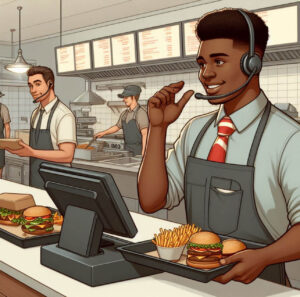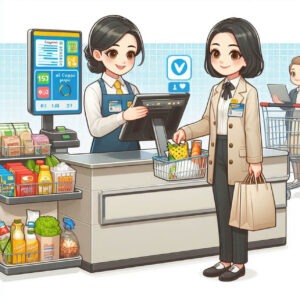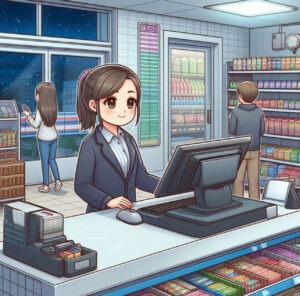Welcome Blessings!
(Tap 🔽 to see more topics!)


The thrill of landing that cashier interview is real! But as you gear up, a thought might pop into your head: What exactly will they ask me? What gets interesting is that being a ‘cashier’ isn’t just one thing. Imagine the difference between the quick pace at a bustling burger joint versus the more detailed transactions at your local grocery store or the focused work at a bank. Because these roles have different vibes, the interview questions you’ll encounter can be surprisingly diverse, depending on where you’re hoping to work.
In today’s article, we will explore eight common kinds of cashier jobs, and for each one, we’ll shine a light on the questions you’re most likely to hear. Beyond just listing questions, we’ll share practical tips to help you connect with the interviewer and solid advice to help you speak confidently, no matter which counter you aim to stand behind.
Think Black Friday crowds, sales tags flying, and someone constantly asking if there’s a discount.

This question aims to understand how you handle pressure. Cashiers in retail stores often deal with long lines, especially during busy times. The interviewer wants to know if you can keep a positive attitude and work efficiently under pressure while ensuring a smooth customer experience. One strategy is to stay calm and efficient.
When there’s a long line, I focus on speed while ensuring customers feel heard. I’ve worked in busy retail stores and learned to keep the energy up while staying friendly. If customers are impatient, I acknowledge their frustration and work quickly to get them through the line.
Retail stores often have strict return and exchange policies. This question tests your ability to handle situations where you must balance customer satisfaction with company rules. They want to know if you can handle those tricky moments diplomatically. The interviewer is looking for problem-solving skills. You might say,
I’ve dealt with returns that didn’t meet policy, and I always try to understand the customer’s perspective and the store’s rules. I once had a customer try to return an item after the return period, but I offered them a store credit to solve the issue. If that weren’t possible, I would consult my manager to ensure the customer felt heard and valued.
Upselling is a standard part of the cashier role, especially in retail. The interviewer wants to see if you’re comfortable promoting additional products or services in a natural and non-pushy way. It also shows your ability to contribute to the store’s revenue. They want to know how you sell without being pushy. A good answer might be,
I recommend products that complement the customer’s purchase. For example, if someone’s buying a shirt, I mention a matching pair of shoes or a special discount on accessories. I’d explain the benefits and discounts when storing credit cards, but only if I sense the customer could benefit.
Busy, fast-paced, and often dealing with carts piled high with food.
Supermarket cashiers often perform repetitive tasks, especially during peak hours. The interviewer checks whether you can stay focused and keep up with the pace for long periods. It also shows whether you can stay sharp and alert to avoid mistakes. This question assesses your stamina and attention to detail.
I focus on maintaining a rhythm and staying organized. I take short mental breaks between transactions to keep sharp. I also watch for patterns, like checking for expired items or double scanning, which keeps me alert.
Cashiers in supermarkets are trusted to prevent theft or dishonest behavior. This question helps the interviewer gauge your ability to handle ethically sensitive situations professionally and tactfully. Honesty and integrity are critical.
I would discreetly let the customer know I saw what happened and politely ask them to scan the item. I’d approach the situation respectfully and understanding, as they might not have realized it. If it escalates, I’d get a manager involved for support.
Supermarkets can get extremely busy, especially at certain times of the day. The interviewer wants to understand how you handle high-pressure situations and whether you can stay composed, efficient, and helpful in a rush. This is your chance to show how you thrive under pressure.
During my last role at a supermarket, I was on the register during lunchtime when the lines were long. I stayed calm, kept a steady pace, and communicated with my coworkers to help bag items faster. I also ensured I was efficient with scanning, asking customers for their loyalty cards in advance to speed up the process.

Orders flying in, drinks spilling, and someone asking for extra sauce every five minutes.
Working in fast food means you’ll sometimes face challenging customers. This question assesses your conflict resolution skills and ability to remain professional in difficult situations. It shows whether you can keep things calm without escalating the customer’s frustration. They want to know how you manage customer service challenges. A great answer might be,
I stay calm and focus on solving the problem rather than reacting to the rudeness. If a customer is upset, I listen carefully to their concerns and offer solutions, like a refund or replacement. In cases where I can’t resolve the issue, I’d involve a manager to ensure the customer is satisfied.
Fast food service is all about speed, and mistakes can happen quickly. The interviewer tests your ability to promptly and effectively correct a situation while maintaining a good customer relationship. Mistakes happen, and employers want someone who can fix them quickly. You might answer,
I would apologize to the customer and quickly correct the order. As a gesture of goodwill, I would either offer them the correct meal, a discount, or a coupon for their next visit. My goal is always to turn an unhappy customer into a loyal one.
You’ll likely need to handle several tasks simultaneously in fast food, from taking orders to preparing food and handling cash. This question assesses whether you can manage multiple tasks effectively, which is crucial in a fast-paced environment. Fast food environments require multitasking. You could say,
Absolutely. I’m used to juggling multiple orders, taking payments, and coordinating with the kitchen. I prioritize tasks and stay organized, ensuring I manage the flow without missing a beat. I’ve learned to remain efficient by focusing on the customer while moving quickly.
Often solo shifts, handling everything from candy bars to fuel transactions.
Convenience stores, especially on night shifts, can be slow. The interviewer wants to know if you can stay productive and attentive even during lulls in customer activity, ensuring the store runs smoothly and safely. For this one, you want to show that you can stay focused even in quiet times. A solid response could be,
I stay alert by organizing and checking inventory during quiet periods. I double-check my cash drawer and review store procedures to ensure everything is running smoothly. Even during slower times, I stay focused on keeping the store secure and assisting customers.
The interviewer wants to assess your ability to handle high-stress situations or emergencies. This shows your ability to think clearly and stay calm during potentially dangerous or stressful situations. This is about handling stress and security. You could answer,
First, I would stay calm and follow the store’s protocol. I’d stay out of harm’s way while notifying the authorities. My main priority would be safety, both for myself and the customers. I’d also try remembering details about the situation to assist law enforcement afterward.
Convenience store cashiers often work alone, especially at night. This question checks if you can handle the responsibility of being the sole person in charge while ensuring everything runs smoothly, safely, and efficiently. Here, they want to know about your independence. You might say,
Yes, I have worked solo during night shifts. I keep the store tidy, monitor security cameras, and manage customer transactions efficiently. I stay organized by keeping a list of tasks and checking them off as I complete them.

There you have it. You see cashiers everywhere, right? But now you know that ringing up someone’s groceries is a different ballgame than checking someone into a hotel or suggesting the perfect popcorn at the movies. Knowing what kind of questions to expect can be your secret weapon.
Remember, you’re not just dealing with cash and cards. You’re connecting with people, staying cool when things get busy, and being the face of good service. So, take a deep breath, familiarize yourself with what we’ve discussed, and walk into that interview knowing you’re ready. We’re cheering you on!
Ready to take the next step? Why not jot down a few examples from your experiences related to the different types of cashier roles we discussed? It’s a great way to build your confidence!

Voila! Until next time!
Additional References:
Wingate, T. G., & Bourdage, J. S. (2024). What are interviews for? A qualitative study of employment interview goals and design. Human Resource Management. https://doi.org/10.1002/hrm.22215
Hardavella, G., Gagnat, A. A., Xhamalaj, D., & Saad, N. (2016). How to prepare for an interview. Breathe, 12(3), e86–e90. https://doi.org/10.1183/20734735.013716
Indeed Editorial Team. (n.d.). Cashier interview questions. Indeed. Retrieved from https://ca.indeed.com/career-advice/interviewing/cashier-interview-questions
ResearchGate. (n.d.). Cashier interviews summary statistics [Data table]. Retrieved from https://www.researchgate.net/figure/Cashier-Interviews-Summary-Statistics_tbl3_352930630